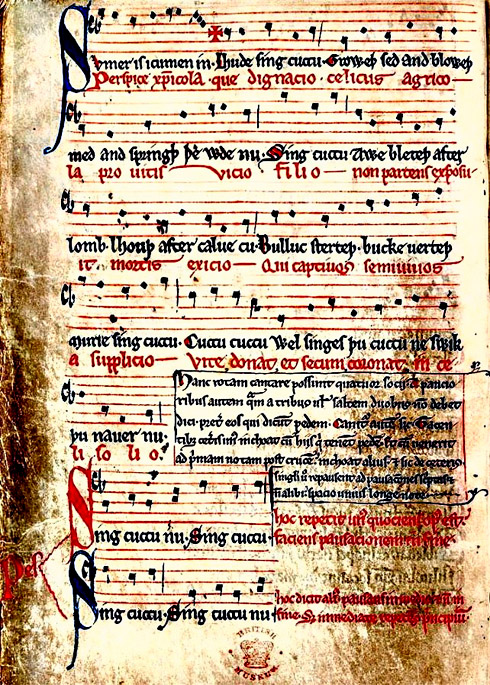Sumer Is Icumen In
"Sumer Is Icumin In" is one of the oldest, if not the oldest, canons in print (circa 1226).

Sumer Is Icumen In
Summer Has Come
Round
Round
(Middle English)
(English)
Svmer is icumen in
Lhude sing cuccu
Groweþ sed
and bloweþ med
and springþ þe wde nu
Sing cuccu
Awe bleteþ after lomb
lhouþ* after calue cu
Bulluc sterteþ
Bucke uerteþ**
Murie sing cuccu
Cuccu cuccu
Wel singes þu cuccu
ne swik þu nauer nu
Sing cuccu nu. Sing cuccu.
Sing cuccu. Sing cuccu nu.
Summer has come,
Loudly sing, Cuckoo!
Seeds grow,
And meadow blooms
And the woods bud anew,
Sing, Cuckoo!
The ewe bleats after the lamb,
The cow moos after the calf,
The bullock leaps,
The buck farts.
Merry sing, Cuckoo!
Cuckoo! Cuckoo!
Well you sing, Cuckoo,
Nor cease you never now.
Sing now, Cuckoo! Sing, Cuckoo!
Sing, Cuckoo! Sing now, Cuckoo!
Notes
*Lhouþ (Lhouth) means "low" which means "moo" (source: OED).
**There are disagreements over the meaning of uerteþ (verteth). Some proposed definitions are:
-Farts
-Darts
-Harbour in the green or fern ("vert" coming from the French word for green)
In the Middle English alphabet, the letter þ is a thorn, equivalent to modern th. We substituted "th" in the lyrics below to make it more readable to the modern reader:
Sumer is icumen in,
Lhude sing cuccu!
Groweth sed
And bloweth med
And springeth the wde nu,
Sing cuccu!
Awe bleteth after lomb,
Lhouth after calve cu.
Bulloc sterteth,
Bucke verteth.
Murie sing cuccu,
Cuccu, cuccu!
Wel singes thu, cuccu;
Ne swik thu naver nu.
Sing cuccu nu. Sing cuccu.
Sing cuccu. Sing cuccu nu.
From that you get to an even more modern spelling:
Summer is a-coming in,
Loudly sing cuckoo,
Groweth seed
And bloweth mead
And springeth the wood now,
Sing cuckoo.
Ewe bleateth after lamb,
Low'th (Moo) after calf the cow,
Bullock starteth,
The buck verteth (farts or darts).
Merry sing cuckoo!
Cuckoo, cuckoo,
Well thou sings Cuckoo,
Nor cease thou never now.
Sing Cuckoo now. Sing Cuckoo.
Sing Cuckoo. Sing cuckoo now.
See full photo of original manuscript below.

Comments
Written down and possibly authored by John of Fornsete, a monk from the Abbey of Reading who died in 1239. Some believe the author was W. de Wycombe, but no one knows for certain who wrote it.
You can read more about Sumer Is Icumen In here.

Thanks!
Thanks and Acknowledgements
Modern English translation: Lisa Yannucci

























